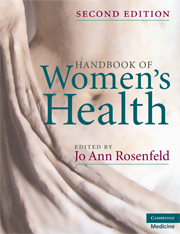Book contents
- Handbook of Women's Health
- Handbook of Women's Health
- Copyright page
- Dedication
- Contents
- Contributors
- Section 1 Introduction
- Section 2 Sexuality
- Section 3 Genitourinary concerns
- Section 4 Breast disorders
- Chapter 19 Benign breast disease
- Chapter 20 Breast cancer screening
- Section 5 Psychological concerns
- Section 6 Common medical problems
- Index
Chapter 19 - Benign breast disease
from Section 4 - Breast disorders
Published online by Cambridge University Press: 26 December 2009
- Handbook of Women's Health
- Handbook of Women's Health
- Copyright page
- Dedication
- Contents
- Contributors
- Section 1 Introduction
- Section 2 Sexuality
- Section 3 Genitourinary concerns
- Section 4 Breast disorders
- Chapter 19 Benign breast disease
- Chapter 20 Breast cancer screening
- Section 5 Psychological concerns
- Section 6 Common medical problems
- Index
Summary
Keywords
- Type
- Chapter
- Information
- Handbook of Women's Health , pp. 205 - 214Publisher: Cambridge University PressPrint publication year: 2009

